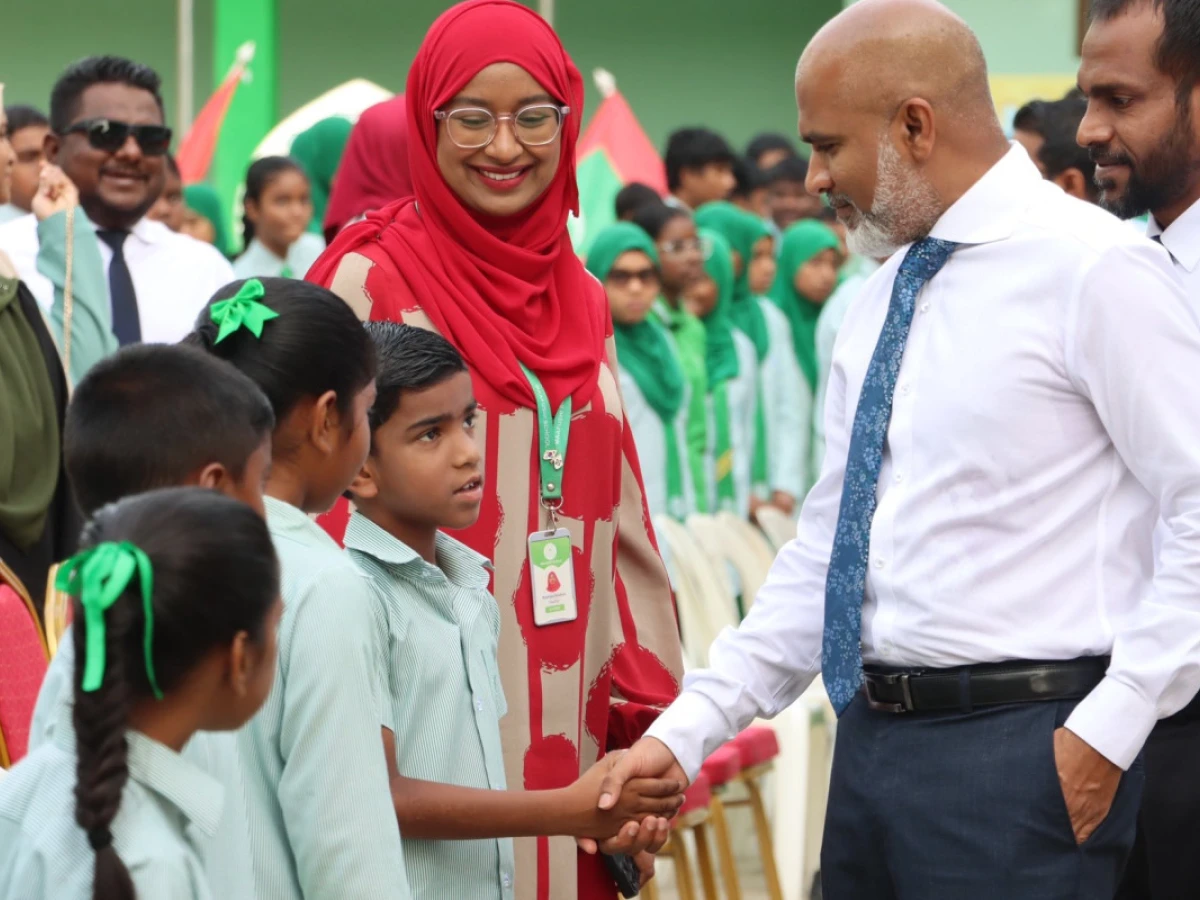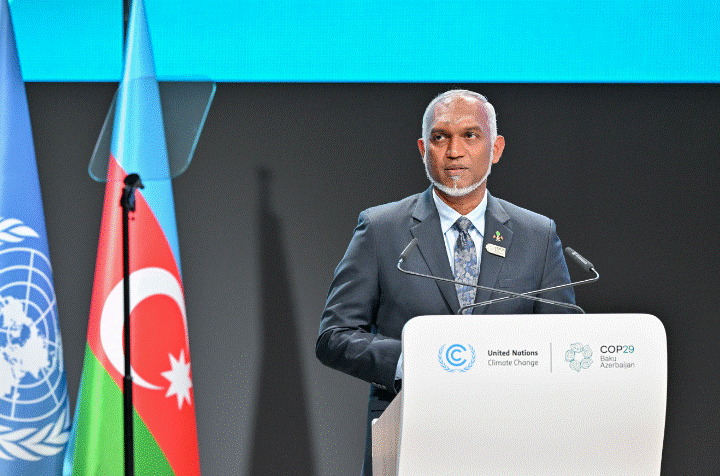MALÉ, Maldives — One year into President Dr. Mohamed Muizzu’s administration, the Maldives stands at a crossroads in its quest for digital transformation. Central to his vision is the Digital Maldives Program, a nine point sweeping initiative designed to integrate 21st-century technology into education and national development.
The weight of the nation’s school children’s backpacks—still burdened with traditional textbooks—serves as a stark reminder of how past efforts to digitize education fell short.
“Digitalization is the cornerstone of our national vision,” President Muizzu said at the Summit of the Future Side Event: A Vision for an Intelligence-Driven Future for Maldives in September 2024. “Through initiatives like the Digital Maldives Program, we are equipping our youth with the skills needed to succeed in the digital economy. Equally, we are ensuring that our women, the backbone of our society, have equal access to these opportunities.” However, his speech notably lacked specific reference to education reforms.
President Muizzu’s ambitious Digital Maldives Program includes the rollout of 5G networks to create smart classrooms and equip schools with the infrastructure needed to support digital learning. As his administration completes its first year with the launch of the Digital Maldives Program, the country grapples with the legacy of a 2017 tablet initiative that promised to transform classrooms but instead exposed the challenges of poorly planned digitization.
A New Administration’s Vision
In his inaugural year, President Muizzu has made bridging the digital divide a cornerstone of his policy agenda. The Digital Maldives Program aims to modernize public services, emphasizing equitable access to technology. However, limited information is available about his education digitalization plans, smart classroom initiatives, or teacher training programs designed to avoid past pitfalls.
The Muizzu administration faces sobering lessons from a $154 million tablet initiative launched in 2017 under then-President Abdulla Yameen. Billed as a groundbreaking leap for the island nation, the program sought to distribute 71,000 Huawei tablets to school children, promising to replace heavy textbooks with sleek, modern devices.
The project, managed by Maxcom Technologies, a local technology vendor, represented an abrupt policy decision made without stakeholder consultation. While it aimed to provide students access to digital textbooks and online resources, the program faltered under the weight of its own ambitions from the start.
Understanding Past Failures
The 2017 initiative’s shortcomings stemmed from several critical oversights. Many schools, especially in remote atolls, lacked stable internet connections, rendering the tablets ineffective. Charging stations and secure storage facilities were either insufficient or nonexistent. The initiative provided minimal training for educators, leaving many unsure how to integrate the devices into their teaching.
Furthermore, the devices arrived without appropriate digital content or curriculum integration. Teachers and students were left without clear guidance on how to incorporate the tablets into learning. Critics argued that the government focused too heavily on hardware procurement while neglecting capacity building and maintenance.
By September 2017, delays plagued the project. Many students had yet to receive tablets, while those who did often found them unusable. Parental concerns mounted, with some questioning whether the technology offered any tangible benefits.
Legal and Financial Aftermath
The program’s failings came to a head in 2023 when Maxcom Technologies sued the government for MVR 23.6 million (approximately $1.5 million) in withheld payments. Initially penalized for delays, Maxcom successfully argued that the government’s repeated deadline extensions had undermined the rollout.
The Civil Court’s ruling highlighted the financial mismanagement that plagued the initiative. Analysts criticized the program as emblematic of a “hardware-first” approach that neglected the systemic changes needed to support digital transformation.
Attempted Recovery
When President Ibrahim Mohamed Solih took office in 2018, his administration inherited the troubled initiative. Rather than abandoning it entirely, Solih’s government attempted to salvage the program by scaling back its scope. They distributed tablets and launched a pilot program to digitize textbooks in 40 schools. However, challenges persisted, including infrastructure gaps, lack of clear policies, teacher training deficiencies, and lingering skepticism from educators.
Learning from Experience
The Maldives’ experience with education digitization offers critical lessons for the Muizzu administration. Successful digital transformation requires reliable infrastructure, including dependable internet access, secure storage facilities, and comprehensive technical support systems.
Equally crucial is teacher preparation. Educators need thorough training and ongoing professional development to effectively integrate technology into their teaching methods. Digital tools must enhance rather than complicate the existing curriculum, requiring careful alignment between traditional and digital teaching methods.
Implementation should follow a measured approach. Starting with pilot programs and scaling up based on real-world feedback minimizes risks and allows for necessary adjustments. Throughout this process, maintaining transparent communication with parents, teachers, and students builds essential trust and ensures reforms address actual needs.
Looking Forward
As the Muizzu administration enters its second year, the stakes for digital education remain high. The promise of lighter backpacks and smarter classrooms continues to motivate reform efforts, but success requires careful planning and sustained investment.
The Digital Maldives Program offers hope that past mistakes will not be repeated. With renewed focus on infrastructure, training, and integration, President Muizzu has an opportunity to redefine the nation’s education landscape. Yet, as the tablets from 2017 gather dust, they remain a potent reminder of the perils of overambition without preparation. The Maldives’ digital future depends on learning from these lessons and building a system that truly carries the weight of its children’s dreams.
Digital Vision: Muizzu’s Nine Key Policy Initiatives
President Muizzu’s September 2024 speech outlined nine core components of the nation’s digital strategy. The government has committed to universal high-speed internet access, with ongoing investments in innovation hubs, technology parks, and advanced technologies. Digital literacy programs target youth and women specifically, while new e-governance systems aim to streamline public services.
The establishment of a National Cybersecurity Agency addresses digital security challenges, while the Development Bank of Maldives provides funding for digital innovation. These initiatives form part of a broader vision for a digitally empowered society that maintains cultural values while promoting inclusivity and sustainable development.
Image courtesy: Atoll Times










